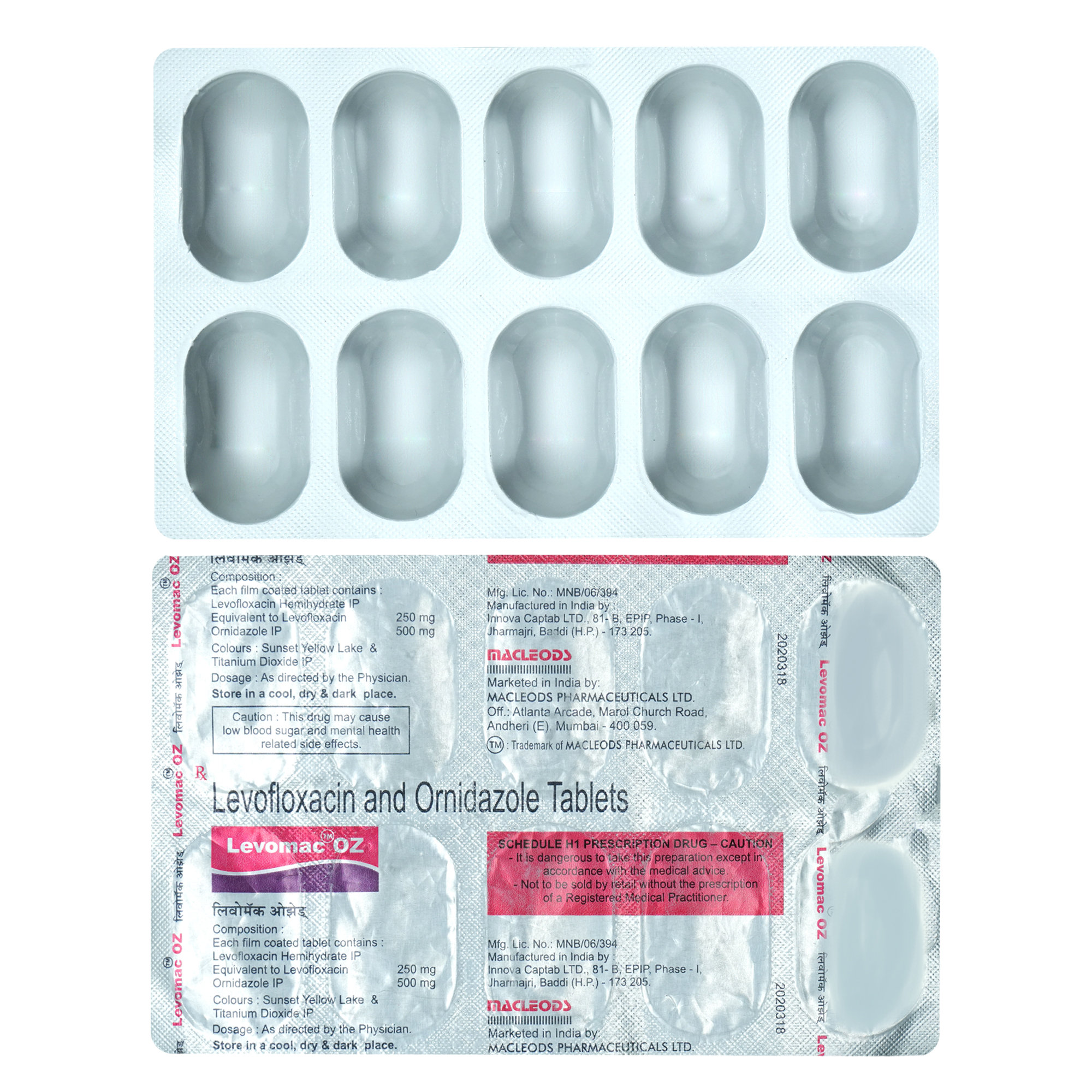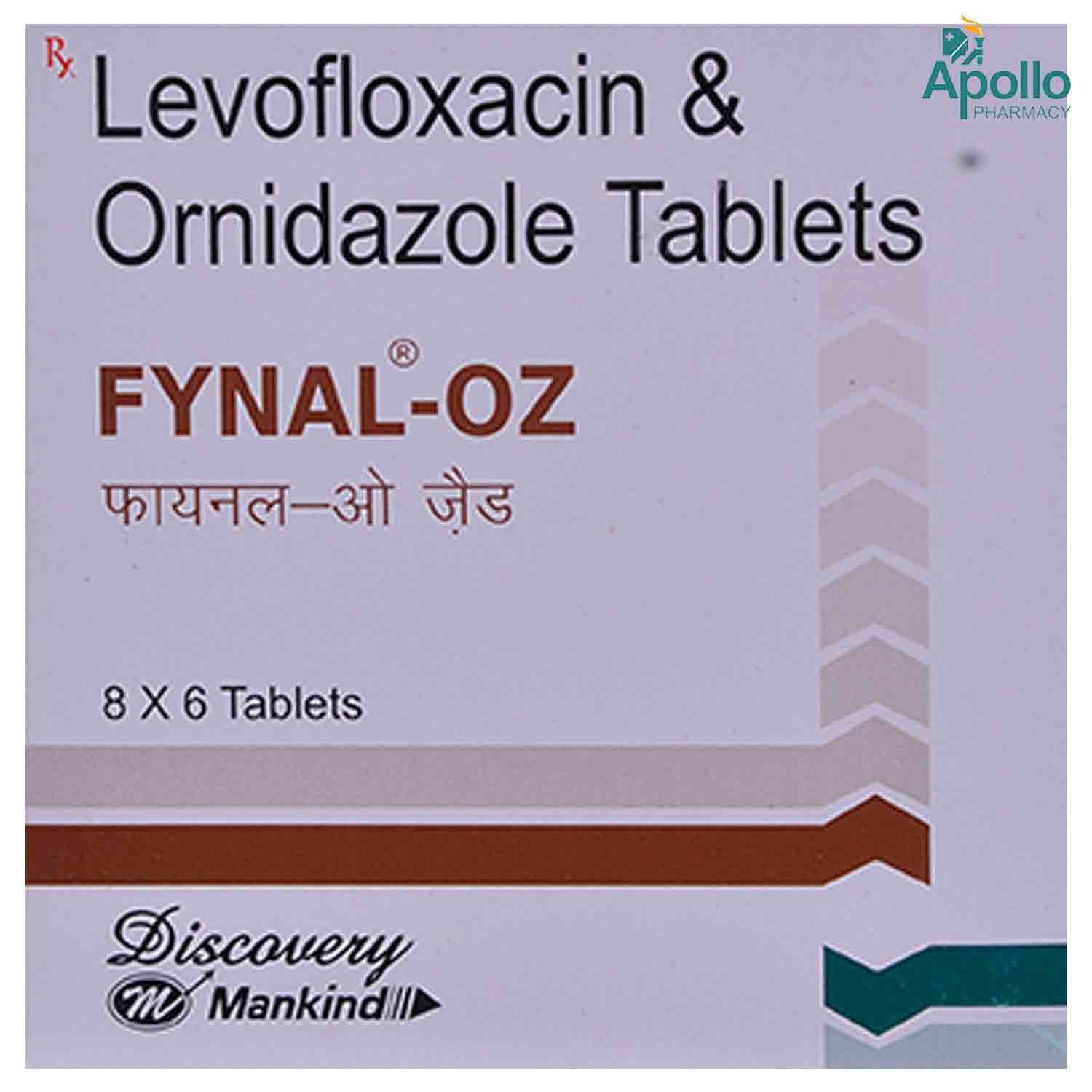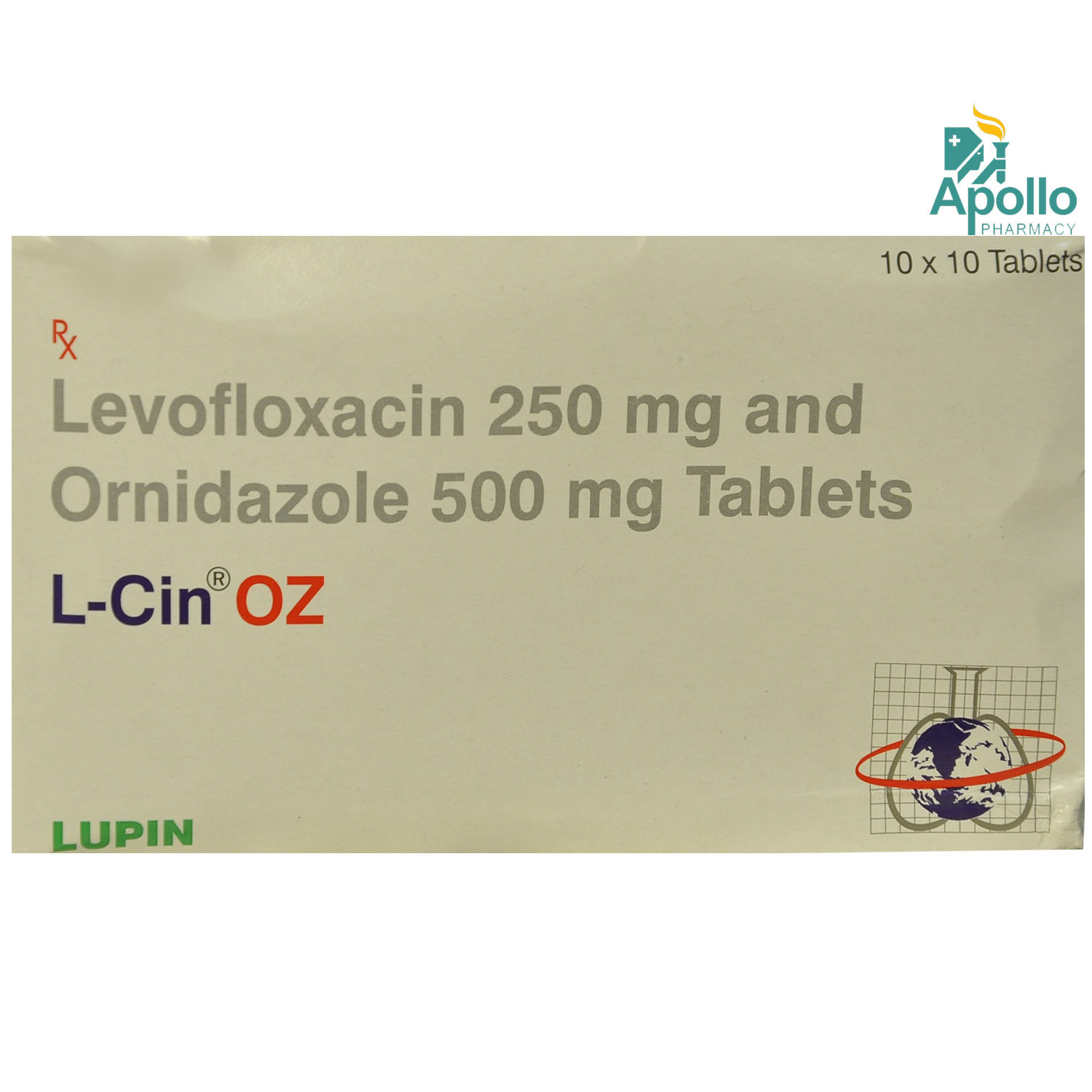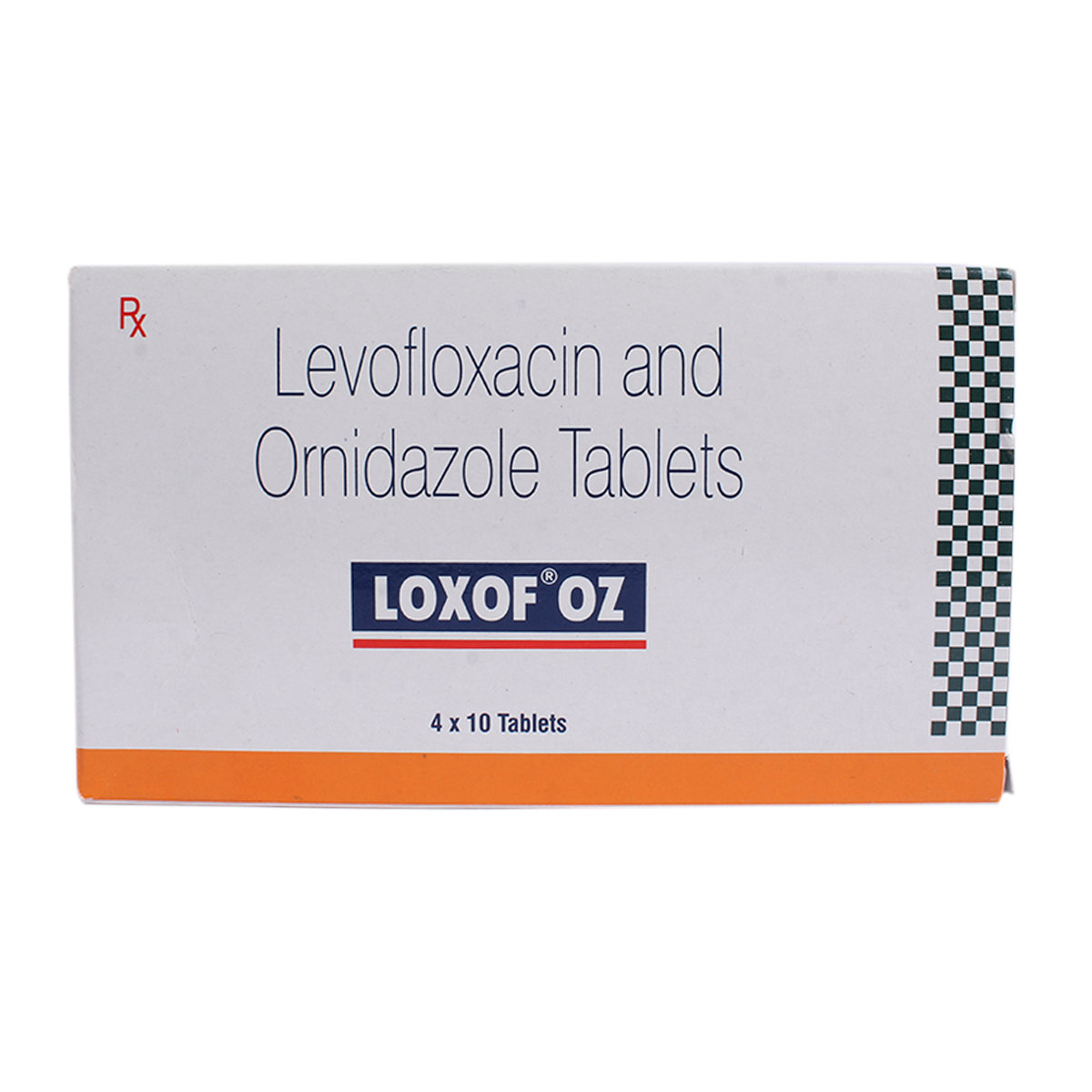Lcterid OZ 250mg/500mg Tablet
MRP ₹87
(Inclusive of all Taxes)
₹13.1 Cashback (15%)
Provide Delivery Location
Online payment accepted
 Prescription drug
Prescription drugWhats That
About Lcterid OZ 250mg/500mg Tablet
Lcterid OZ 250mg/500mg Tablet belongs to the class of 'antibiotics', primarily used to treat diarrhoea and dysentery. It helps treat various bacterial and parasitic infections, such as pneumonia, bronchitis, intestinal, vaginal, urinary tract infections and genital infections. Diarrhoea is a condition that causes the frequent passing of loose or watery stools. Dysentery is an intestinal inflammation that leads to severe diarrhoea accompanied by mucus or blood in the stools. Bacterial infections are caused due to the multiplication of harmful bacteria inside or on the body.
Lcterid OZ 250mg/500mg Tablet contains two antibiotic medicines, namely: Levofloxacin and Ornidazole. Levofloxacin belongs to a class of drugs called quinolone antibiotics. It works by inhibiting an enzyme called gyrase, which is responsible for the growth and development of bacterial DNA. Ornidazole is an anti-amoebic/ amebicide (kills amoeba that causes amoebic dysentery) and antiprotozoal (fights against protozoal infections) medicine. It also exerts antibacterial action and kills harmful bacteria and parasites (amoeba) by damaging their DNA by interfering with the protein formation process.
Please take Lcterid OZ 250mg/500mg Tablet in the dose and duration prescribed by your doctor based on your medical condition. Lcterid OZ 250mg/500mg Tablet is generally safe to use. However, some may experience side effects like nausea, loss of appetite, constipation, diarrhoea, trouble sleeping, dizziness and headache. Most of these side effects of Lcterid OZ 250mg/500mg Tablet do not require medical attention and gradually resolve over time. If these side effects persist longer, please consult your doctor.
If you are allergic to Lcterid OZ 250mg/500mg Tablet or any other medicines, please tell your doctor. Do not suddenly stop this medicine to avoid unpleasant side effects and sudden withdrawal symptoms. Intake of probiotics, prebiotics and plenty of fluids is recommended if you suffer from dysentery and diarrhoea. Do not drive or operate heavy machinery after taking Lcterid OZ 250mg/500mg Tablet as it may cause dizziness. Avoid alcoholic beverages during your treatment, as it can worsen the disease and side effects. Pregnant and breastfeeding women should use Lcterid OZ 250mg/500mg Tablet with proper consultation and caution.
Uses of Lcterid OZ 250mg/500mg Tablet
Directions for Use
Key Benefits
Lcterid OZ 250mg/500mg Tablet contains Levofloxacin and Ornidazole. It treats infections of bacteria and parasites. Levofloxacin is a quinolone antibiotic that inhibits bacterial DNA gyrase, an enzyme required for the replication, transcription and repair of the DNA. It is also used to treat anthrax (a rare but serious bacterial illness) and certain types of plague. Ornidazole is an anti-amoebic, antiprotozoal and antibacterial medicine. It kills harmful protozoa and certain anaerobic bacteria by damaging their DNA and interfering with the protein formation process. It treats amoebiasis (amoebic dysentery), giardiasis (infection of the small intestine) and trichomoniasis (a sexually transmitted infection caused by a parasite). Collectively, Lcterid OZ 250mg/500mg Tablet treats various bacterial and parasitic infections, such as diarrhoea, dysentery, pneumonia, bronchitis, intestinal, vaginal, urinary tract infections and genital infections. Lcterid OZ 250mg/500mg Tablet does not work for viral infections like common cold and flu.
Storage
- Prepare for a restful night's sleep: Develop a calming pre-sleep routine, like reading or meditation, to help your body relax and prepare for sleep.
- Create a sleep-conducive Environment: Make bedroom a sleep haven by ensuring it is quiet, dark and calm.
- Follow a Sleep Schedule: Go to bed and get up at the same time every day to help regulate your body's internal clock and increase sleep quality.
- Try relaxing techniques like deep breathing, mindfulness meditation and any others.
- Limit stimulating activities before bedtime: Avoid stimulating activities before bedtime to improve sleep quality.
- Monitor Progress: Keep track of your sleep patterns to identify areas for improvement.
- Consult a doctor if needed: If these steps don't improve your sleep, consult a doctor for further guidance and therapy.
- Tell your doctor immediately if you experience shortness of breath after taking medication.
- Your doctor may adjust the medication regimen or dosage or give alternative medical procedures to minimize the symptoms of shortness of breath.
- Monitor your oxygen levels and breathing rate regularly to track changes and potential side effects.
- For controlling stress and anxiety, try relaxation techniques like deep breathing exercises, meditation, or yoga.
- Make lifestyle changes, such as quitting smoking, exercising regularly, and maintaining a healthy weight.
- Seek emergency medical attention if you experience severe shortness of breath, chest pain, or difficulty speaking.
- Follow up regularly with your doctor to monitor progress, adjust treatment plans, and address any concerns or questions.
- Inform Your Doctor: Notify your doctor immediately about your diarrhoea symptoms. This allows them to adjust your medication or provide guidance on managing side effects.
- Stay Hydrated: Drink plenty of fluids to replace lost water and electrolytes. Choose water, clear broth, and electrolyte-rich drinks. Avoid carbonated or caffeinated beverages to effectively rehydrate your body.
- Follow a Bland Diet: Eat easy-to-digest foods to help firm up your stool and settle your stomach. Try incorporating bananas, rice, applesauce, toast, plain crackers, and boiled vegetables into your diet.
- Avoid Trigger Foods: Steer clear of foods that can worsen diarrhoea, such as spicy, fatty, or greasy foods, high-fibre foods, and dairy products (especially if you're lactose intolerant).
- Practice Good Hygiene: Maintain good hygiene to prevent the spread of infection. To stay healthy, wash your hands frequently, clean and disinfect surfaces regularly, and avoid exchanging personal belongings with others.
- Take Anti-Diarrheal Medications: If your doctor advises, anti-diarrheal medications such as loperamide might help manage diarrhoea symptoms. Always follow your doctor's directions.
- Keep track of your diarrhoea symptoms. If they don't get better or worse or are accompanied by severe stomach pain, blood, or dehydration signs (like extreme thirst or dark urine), seek medical help.
- Inform your doctor about your constipation symptoms. They may adjust your medication or advise alternative treatments.
- Stay hydrated by drinking sufficient of water (at least 8-10 glasses a day) to help soften stool and promote bowel movements.
- Increase fibre intake by eating foods high in fibre, such as fruits, whole grains, vegetables and legumes, to help bulk up the stool.
- Establish a bowel routine by trying to go to the bathroom at the same time each day to train your bowels.
- Engaging in regular exercise, like walking or yoga, can support in bowel movement stimulation.
- Consult your doctor if constipation persists, and discuss alternative treatments or adjustments to your medication.
- Take medications with food (if recommended): It can help prevent stomach distress and indigestion.
- Eat smaller, more frequent meals: Divide daily food intake into smaller, more frequent meals to ease digestion.
- Avoid trigger foods: Identify and avoid foods that trigger indigestion, such as spicy, fatty, or acidic foods.
- Stay upright after eating: Sit or stand upright for at least 1-2 hours after eating to prevent stomach acid from flowing into the oesophagus.
- Avoid carbonated drinks: Avoid drinking carbonated beverages, such as soda or beer, which can worsen indigestion.
- Manage stress: To alleviate indigestion, engage in stress-reducing activities like deep breathing exercises or meditation.
- Consult a doctor if needed: If indigestion worsens or persists, consult a healthcare professional to adjust the medication regimen or explore alternative treatments.
- Report the itching to your doctor immediately; they may need to change your medication or dosage.
- Use a cool, damp cloth on the itchy area to help soothe and calm the skin, reducing itching and inflammation.
- Keep your skin hydrated and healthy with gentle, fragrance-free moisturizers.
- Try not to scratch, as this can worsen the itching and irritate your skin.
- If your doctor prescribes, you can take oral medications or apply topical creams or ointments to help relieve itching.
- Track your itching symptoms and follow your doctor's guidance to adjust your treatment plan if needed. If the itching persists, consult your doctor for further advice.
- Chest pain may last for a while and needs immediate medical attention as it is a significant health issue to be attended to.
- Take rest and refrain from doing physical activity for a while, and restart after a few days.
- Try applying an ice pack to the strained area for at least 20 minutes thrice a day. Ice pack thus helps reduce inflammation.
- Sit upright and maintain proper posture if there is persistent chest pain. • Use extra pillows to elevate your position and prop your chest up while sleeping.
Drug Warnings
Brief your medical history to doctor, if you are allergic to Lcterid OZ 250mg/500mg Tablet or any of its components. Please let your doctor know before starting Lcterid OZ 250mg/500mg Tablet if you have a history liver or kidney diseases, tendonitis (inflammation of the tendon, a tissue connecting muscle and bone), fits, diabetes, dehydration, blood dyscrasia (decreased peripheral blood cell counts), colitis (inflammation of the colon) or undergoing dialysis treatment. Levofloxacin in Lcterid OZ 250mg/500mg Tablet can make myasthenia gravis (muscle weakness) worse, hence you should take Lcterid OZ 250mg/500mg Tablet only under doctor's supervision. Please consult your doctor if you are pregnant or breastfeeding before starting Lcterid OZ 250mg/500mg Tablet. Do not drive or operate heavy machinery after taking Lcterid OZ 250mg/500mg Tablet as it may cause dizziness. Please try avoiding alcoholic beverages during your treatment, as it worsens the disease and side effects. Lcterid OZ 250mg/500mg Tablet is not recommended for patients younger than 18 years of age.
Drug-Drug Interactions
Drug-Drug Interactions
Login/Sign Up
The combination of Amiodarone and Lcterid OZ 250mg/500mg Tablet may significantly raise the risk of an abnormal heart rhythm.
How to manage the interaction:
Despite the fact that Amiodarone and Lcterid OZ 250mg/500mg Tablet interact, it can be taken if prescribed by a doctor. If you get dizziness, lightheadedness, fainting, or fast or racing heartbeats, consult a doctor. Do not stop taking any medications without visiting a doctor.
Combining Lcterid OZ 250mg/500mg Tablet with Disopyramide can increase the risk of irregular heart rhythm .
How to manage the interaction:
Taking Lcterid OZ 250mg/500mg Tablet with Disopyramide is not recommended, as it can result in an interaction, it can be taken if your doctor has advised it. However, if you experience any symptoms like sudden dizziness, lightheadedness, fainting, or fast or pounding heartbeats, contact your doctor immediately. Do not discontinue any medications without first consulting your doctor.
Using sotalol together with Lcterid OZ 250mg/500mg Tablet can increase the risk of an irregular heart rhythm that may be serious. The risk increases in patients with a history of heart illness or electrolyte imbalance.
How to manage the interaction:
Taking Lcterid OZ 250mg/500mg Tablet with Sotalol is generally avoided as it can result in an interaction, it can be taken if your doctor has advised it. If you experience sudden dizziness, lightheadedness, fainting, or fast or pounding heartbeats, contact a doctor immediately. Do not discontinue any medications without consulting a doctor.
Taking Lcterid OZ 250mg/500mg Tablet with Ziprasidone can increase the risk of abnormal heart rhythm.
How to manage the interaction:
Taking Lcterid OZ 250mg/500mg Tablet with Ziprasidone is not recommended, but it can be taken together if prescribed by a doctor. However, consult your doctor if you experience sudden dizziness, lightheadedness, fainting, shortness of breath. Do not discontinue any medications without consulting a doctor.
Using arsenic trioxide together with Lcterid OZ 250mg/500mg Tablet can increase the risk of an irregular heart rhythm.
How to manage the interaction:
Taking Lcterid OZ 250mg/500mg Tablet with Arsenic trioxide together can result in an interaction, but it can be taken if a doctor has advised it. If you experience any symptoms like an irregular heart rhythm, severe or prolonged diarrhea, vomiting, complications, sudden dizziness, feeling lightheaded, fainting, having trouble breathing, or feeling your heart beating fast or irregularly, you should call a doctor right away. Do not discontinue any medications without consulting a doctor.
Taking Lcterid OZ 250mg/500mg Tablet with Dexamethasone can induce tendinitis(inflammation of the thick fibrous cords that attach muscle to bone. These cords are called tendons).
How to manage the interaction:
Concomitant administration of Lcterid OZ 250mg/500mg Tablet with dexamethasone can result in an interaction, it can be taken if a doctor has advised it. If you experience pain, swelling, or inflammation in a tendon location such as the back of the ankle, shoulder, biceps, hand, or thumb, call a doctor immediately. Do not discontinue the medication without consulting a doctor.
Taking Lcterid OZ 250mg/500mg Tablet with bedaquilline increases the risk of an abnormal heart rhythm.
How to manage the interaction:
Concomitant administration of Lcterid OZ 250mg/500mg Tablet alongside bedaquilline can result in an interaction, it can be taken if a doctor has advised it. However, if you experience abrupt dizziness, lightheadedness, fainting, shortness of breath, or rapid heartbeat, get medical help immediately. Do not discontinue any medications without first consulting a doctor.
Taking Lcterid OZ 250mg/500mg Tablet with cabozantinib increases the risk of an abnormal heart rhythm.
How to manage the interaction:
Concomitant administration of Lcterid OZ 250mg/500mg Tablet with cabozantinib can result in an interaction, it can be taken if a doctor has advised it. However, if you experience abrupt dizziness, lightheadedness, fainting, shortness of breath, or rapid heartbeat, get medical help immediately. Do not discontinue any medications without consulting a doctor.
Co-administration of Metformin with Lcterid OZ 250mg/500mg Tablet can affect blood glucose levels - Both hyperglycemia (high blood glucose) and, less frequently, hypoglycemia (low blood glucose).
How to manage the interaction:
There is a possibility of interaction between Metformin and Lcterid OZ 250mg/500mg Tablet, but they can be taken together if a doctor has prescribed them. Consult a doctor if you experience Symptoms of hypoglycemia- headache, dizziness, drowsiness, nervousness, confusion, tremor, nausea, hunger, weakness, perspiration, palpitation, and rapid heartbeat and Symptoms of hyperglycemia may include increased thirst, increased hunger, and increased urination. Do not discontinue any medications without consulting a doctor.
Taking Lcterid OZ 250mg/500mg Tablet with Glipizide may affect blood glucose levels. Both high blood sugar levels or and, less frequently, low blood glucose have been reported.
How to manage the interaction:
Although there is a possible interaction Glipizide can be taken with Lcterid OZ 250mg/500mg Tablet if prescribed by the doctor. Consult the prescriber if you experience dizziness, drowsiness, headache, nervousness, confusion, tremors, nausea, hunger, weakness, perspiration, palpitation, and rapid heartbeat, increased urination, increased thirst, or increased hunger. Monitoring of blood glucose levels is advised. Do not discontinue the medications without consulting a doctor.
Drug-Food Interactions
Drug-Food Interactions
Login/Sign Up
Diet & Lifestyle Advise
- Antibiotics can alter the useful bacteria in the stomach. Therefore, you are advised to take foods rich in probiotics such as yoghurt/curd, kefir, sauerkraut, tempeh, kimchi, miso, kombucha, buttermilk, natto and cheese.
- Eat fibre rich food like whole grains, beans, lentils, berries, broccoli, peas and bananas.
- Avoid foods rich in calcium, grapefruit and grapefruit juice as they might hinder antibiotic's absorption.
- If you have diarrhoea try to drink appropriate amounts of fluids to avoid dehydration.
- If you have minor diarrhoea (less than four stools daily) drinking caffeine-free soft drinks, juices or sport rehydration drinks can be sufficient.
- If the diarrhoea is more severe, specially formulated rehydration drinks should be taken.
- Avoid intake of alcoholic beverages with Lcterid OZ 250mg/500mg Tablet as it can make you dehydrated and may affect your sleep. This can make it harder for your body to aid the Lcterid OZ 250mg/500mg Tablet in fighting off infections.
Side Effects of Lcterid OZ 250mg/500mg Tablet
- Nausea
- Loss of appetite
- Constipation
- Diarrhoea
- Trouble sleeping
- Dizziness
- Headache
Habit Forming
Therapeutic Class
All Substitutes & Brand Comparisons
RX
Out of StockNot for online saleLeeve 500mg Tablet
Pifer Pharmaceuticals Pvt Ltd
₹70
(₹6.3 per unit)
19% CHEAPERRX
Out of StockNot for online saleLevoday OZ 250mg/500mg Tablet
Zydus Cadila
₹75
(₹6.75 per unit)
13% CHEAPERRX
Out of StockNot for online saleLevofun-OZ Tablet
₹80
(₹7.2 per unit)
8% CHEAPER
Author Details
We provide you with authentic, trustworthy and relevant information
Drug-Diseases Interactions
Drug-Diseases Interactions
Login/Sign Up
FAQs
Lcterid OZ 250mg/500mg Tablet contains Levofloxacin and Ornidazole. These drugs are antibiotics that kill and prevent the microbial growth that causes diarrhoea, dysentery and other parasitic and bacterial infections.
Please let your doctor know if you have a history of allergic reactions to medicines, liver or kidney diseases, diabetes, joint or tendon problems (tendonitis, bursitis), mood disorders (depression), myasthenia gravis (muscle weakness), blood dyscrasia (decreased peripheral blood cell counts), peripheral neuropathy (nerve damage), fits, aneurysm (weakening of an artery), blockage of the aorta or other blood vessels, high blood pressure and connective tissue disorders like Marfan syndrome and Ehlers-Danlos syndrome.
Lcterid OZ 250mg/500mg Tablet consists of Levofloxacin, a quinolone antibiotic that may cause hypoglycaemia (low blood sugar levels) or hyperglycaemia (high blood sugar levels). It is advised to consult your doctor before using Lcterid OZ 250mg/500mg Tablet and monitor your blood sugar levels regularly.
Do not stop using Lcterid OZ 250mg/500mg Tablet even if you feel better until the doctor's advised course is finished. Your symptoms may improve, but the infection may not be cured completely.
Lcterid OZ 250mg/500mg Tablet contains a quinolone antibiotic, Levofloxacin that can affect the live vaccines like typhoid vaccine and decrease its effectiveness. Please consult a doctor before you start Lcterid OZ 250mg/500mg Tablet if you are undergoing any vaccinations.
Antacids and multivitamins with minerals can decrease the efficacy of Lcterid OZ 250mg/500mg Tablet. Hence, it is recommended to take Lcterid OZ 250mg/500mg Tablet 2 to 4 hours before or 4 to 6 hours after taking magnesium/aluminium antacids, sucralfate, zinc or iron preparations, and multivitamins with minerals.
Drug-Drug Interactions Checker List
- WARFARIN
- ASPIRIN
- ESCITALOPRAM
- VECURONIUM
- QUINIDINE
- ETHINYLESTRADIOL
Special Advise
- Levofloxacin can cause serious tendon problems and nerve damage, hence you should be cautious. If you experience any symptoms like severe headaches, extreme hunger, irritability, numbness, tingling, burning pain, confusion, agitation and memory problems, please stop using this medicine and seek immediate medical advice.
- Lcterid OZ 250mg/500mg Tablet contains Levofloxacin, which might produce false-positive urine screening results for opiates. Inform the laboratory staff that you are taking Lcterid OZ 250mg/500mg Tablet.
- Monitor your blood sugar levels regularly since Levofloxacin may affect your glucose levels in diabetes.
- Quinolone antibiotics like Levofloxacin may cause QT prolongation (heart muscle takes longer than normal to recharge between beats) in electrocardiogram (ECG) in some patients.
Disease/Condition Glossary
Diarrhoea is a condition that causes the frequent passing of loose or watery stools. It is caused by bacteria (campylobacter and Escherichia coli), virus (norovirus or rotavirus) and parasites in contaminated food and water.
Dysentery is an intestinal inflammation that leads to severe diarrhoea accompanied by mucus or blood in the stools. It is mostly caused by shigella bacteria (shigellosis) or an amoeba.
Bacterial infection occurs when harmful bacteria grow in the body and causes infection. It can infect any part of the body and multiply very quickly. Bacteria occur in three basic shapes: spherical, rod and spiral-shaped. Bacteria may be gram-positive (have thick cell wall) or gram-negative (do not have a cell wall). Some common symptoms of a bacterial infection include cough, fever and tiredness.

Have a query?
Alcohol
Safe if prescribed
Alcohol consumption may worsen the side effect of Lcterid OZ 250mg/500mg Tablet like dizziness. It is better to avoid alcohol while you are being treated with Lcterid OZ 250mg/500mg Tablet.
Pregnancy
Consult your doctor
Lcterid OZ 250mg/500mg Tablet is not recommended for use during pregnancy since it may have harmful effects on the developing baby. Please consult your doctor if you are planning to become pregnant or already pregnant before starting Lcterid OZ 250mg/500mg Tablet.
Breast Feeding
Consult your doctor
Levofloxacin in Lcterid OZ 250mg/500mg Tablet is excreted into the breast milk. Please consult your doctor before taking Lcterid OZ 250mg/500mg Tablet if you are breastfeeding.
Driving
Safe if prescribed
Lcterid OZ 250mg/500mg Tablet may make you feel dizzy. Do not drive or operate machinery if you experience any impairment of skills, dizziness, and visual disturbances while using Lcterid OZ 250mg/500mg Tablet.
Liver
Consult your doctor
Please take Lcterid OZ 250mg/500mg Tablet with caution and doctor's advice if you have a history of liver diseases/conditions.
Kidney
Consult your doctor
Please take Lcterid OZ 250mg/500mg Tablet with caution and doctor's advice if you have a history of kidney diseases/conditions.
Children
Safe if prescribed
Lcterid OZ 250mg/500mg Tablet is not recommended for patients younger than 18 years of age.











